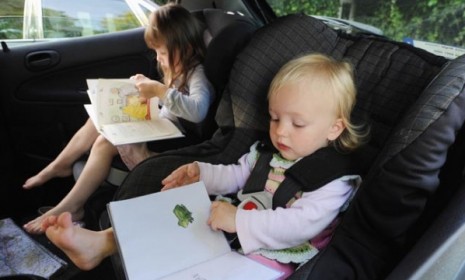Are children really 'inferior goods'?
An economist says they are, since the more money we have, the fewer kids we want

A free daily email with the biggest news stories of the day – and the best features from TheWeek.com
You are now subscribed
Your newsletter sign-up was successful
If you think parents have strong feelings about big vs. small families, try discussing the matter with economists. This spring, Bryan Caplan stirred debate by urging moms and dads that they could have, and enjoy, more children if they stopped wasting time and money with intense child-rearing techniques. Now, a new debate has erupted, after economist Justin Wolfers wrote at The New York Times' Freakonomics blog that children are "inferior goods," because we want fewer of them as our income increases — as opposed to "normal goods," which we consume more of as we get richer. Is that really how we see our kids?
Absolutely. The numbers back up Wolfers' theory: If kids were "normal goods," says Catherine Rampell at The New York Times' Economix blog, wealthier families would have more of them. Yet women in richer countries have fewer children, and Americans with lower incomes want bigger families. Indeed, "only a third of people with annual household incomes over $75,000 say they want families with three or more children." But look at Americans who make less than that, and 44 percent say they want at least three children. "In Lake Wobegone all children may be above average, but across America, children appear to be inferior — at least economically speaking."
"Richer people want fewer children"
The Week
Escape your echo chamber. Get the facts behind the news, plus analysis from multiple perspectives.

Sign up for The Week's Free Newsletters
From our morning news briefing to a weekly Good News Newsletter, get the best of The Week delivered directly to your inbox.
From our morning news briefing to a weekly Good News Newsletter, get the best of The Week delivered directly to your inbox.
No. But the more you make, the more you give up to have kids: Wolfers has it wrong, says Karl Smith at Modeled Behavior. For kids to be "inferior goods," we would have to be replacing them with something we can afford more of as we get richer. That's not what's happening. It's just that as we get richer, the price of our time and labor goes up, so we "have to sacrifice more valuable labor time and more valuable education time in order to have kids."
"Are children inferior goods?"
Economists can't tell the whole story: The statistics seem more friendly to Wolfers' argument than to Caplan's, says Sierra Black at Babble, as wealthy parents do seem to want smaller families, which would, technically, make them "inferior goods." But "that doesn’t mean kids are a bad thing," and it doesn't tell us anything about what goes into these decisions on family size. "There's a lot more that goes into the choice to have a kid than just the economics of it."
"Children are 'inferior goods,' says economist"
A free daily email with the biggest news stories of the day – and the best features from TheWeek.com